Off the west coast of mainland Thailand in the Andaman Sea lies Phuket - a tropical island with soft sand beaches, palm trees, and all the paraphernalia of a typical tropical paradise. It is definitely a tourist dream. But how good is Phuket for permanent living?
If you are considering long-term residence in Phuket, this guide is for you. It covers lifestyle aspects, financial considerations, practical details, challenges, and potential benefits of living in Phuket as an expat.
Secure Peace of Mind with Best-Value International Health Coverage
International Citizens Insurance provide free, no-obligation quotes from the leading international health insurance providers with plans tailored to meet your needs. Trusted by thousands of expats worldwide.
How to get to Phuket
Phuket Island is connected by the Sarasin Bridge to Phang Nga province to the north, so there are multiple options for land transport, including your own car.
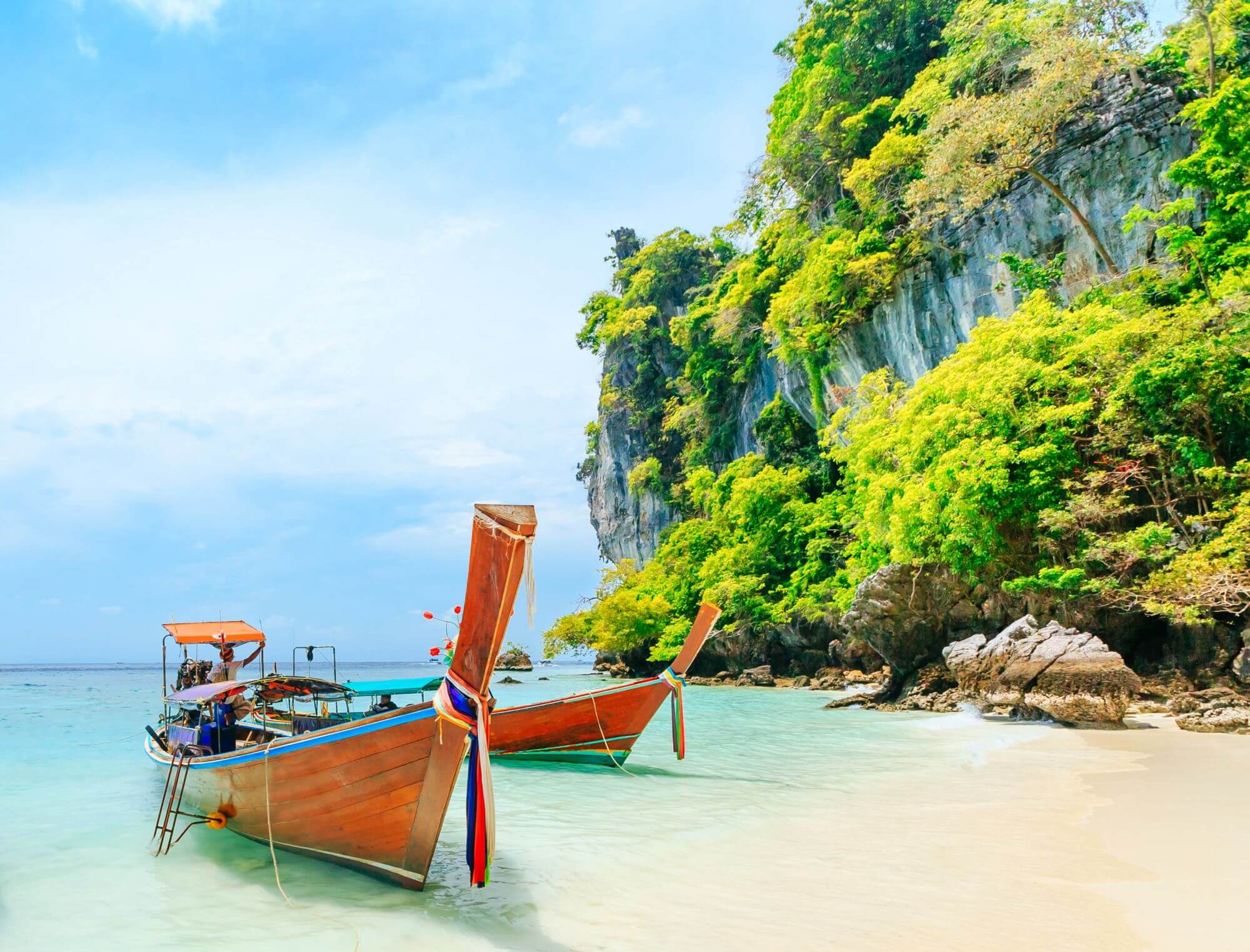
Air travel: You can fly directly into Phuket International Airport, which has connections from major cities worldwide. Multiple airlines offer domestic flights from Bangkok, Chiang Mai, Krabi, and others to Phuket International Airport.
Bus: Several bus companies operate long-distance routes between Phuket and major cities. Expect a journey of around 12 hours from Bangkok.
Train: While there's no train station on Phuket, you can take a train to a nearby mainland city like Surat Thani and then continue your journey by bus to the island.
Ferries: Speedboats and ferries travel to Phuket from multiple locations, including Phi Phi (Tonsai), Phi Phi (Laemthong), Koh Lanta, Railay, Krabi Town, Ao Nang, Langkawi, Koh Lipe, Koh Mook, Koh Kradan, Koh Libong, Koh Ngai and Trang.
Visas and residency
So you have come to Phuket as a tourist and want to stay for longer? You need to sort out your residency. Here are the options:
Thai Retirement Visa (O-A):
- For individuals aged 50 and above.
- Requires proof of financial stability (800,000 THB in a Thai bank or monthly income of 65,000 THB).
Thailand Elite Visa:
- Long-term residency option for investors.
- Offers a 5-year visa starting with a one-time fee of 600,000 THB under the Elite Easy Access program.
Thailand Wealthy Investor Visa:
- Targets high-net-worth individuals investing at least $1 million in Thai assets.
- Provides a 10-year visa, suitable for significant investors in the country.
Digital Nomads:
- No specific visa yet, but many use the Thai Tourist Visa or the Special Tourist Visa (STV).
- STV allows stays of up to 270 days, and a long-term digital nomad visa is under consideration.
Thai Business Visa (Non-Immigrant B Visa):
- For those intending to work or start a business in Thailand.
- Requires a work permit and sponsorship from a Thai company.
For more details, read our Thailand Visas And Residency guide.
Cost of living in Phuket
Phuket generally has a higher cost of living compared to other popular destinations in Thailand, with the exception of Bangkok. It is more expensive than Chiang Mai and Pattaya and similar to Koh Samui, with approximately the same rental and dining expenses but more amenities and better-developed infrastructure.
Overall, Phuket remains one of the pricier options but compensates with its exceptional lifestyle and scenic beauty.
Housing costs
Renting an apartment:
Renting a 2-bedroom apartment can start from about $600 in an affordable central area and go as high as $2,500 for a luxury 2-bedroom condo with ocean views around Laguna.
Renting a house:
For $1,500, it is possible to rent a lovey 2-bed villa with a swimming pool in Chalong. A 3-bed townhouse in Rawai, an affordable location popular with expats, can be rented for about ¢1,300.
Cheaper areas:
- Chalong: Offers affordable rentals and a quiet, relaxed atmosphere.
- Rawai: Known for its lower rent prices and a strong expat community.
- Kathu: Centrally located with reasonable rents and close to amenities.
Expensive areas:
- Patong: Known for its nightlife and vibrant atmosphere, Patong is one of the most expensive areas in Phuket.
- Surin: Offers luxury villas and high-end amenities, making it a prime choice for those seeking a lavish lifestyle.
- Laguna: Home to upscale resorts and golf courses, Laguna is perfect for high-budget retirees.
Utilities
The cost of utilities can vary, but here are the average monthly expenses:
- Electricity: $50 - $100
- Water: $10 - $20
- Internet: $20 - $30
- Cable TV: $15 - $25
For a more general overview of Thailand’s living costs and expenses, read our guide on the cost of living in Thailand.
Buying real estate
In Thailand, foreigners face restrictions on property ownership, particularly when it comes to land. While foreigners cannot directly own land, they can legally purchase condominiums as long as foreign ownership in the building does not exceed 49% of the total floor area.
For those interested in owning land, common alternatives include long-term leases (typically 30 years, renewable) or setting up a Thai company where the foreigner holds a minority share.
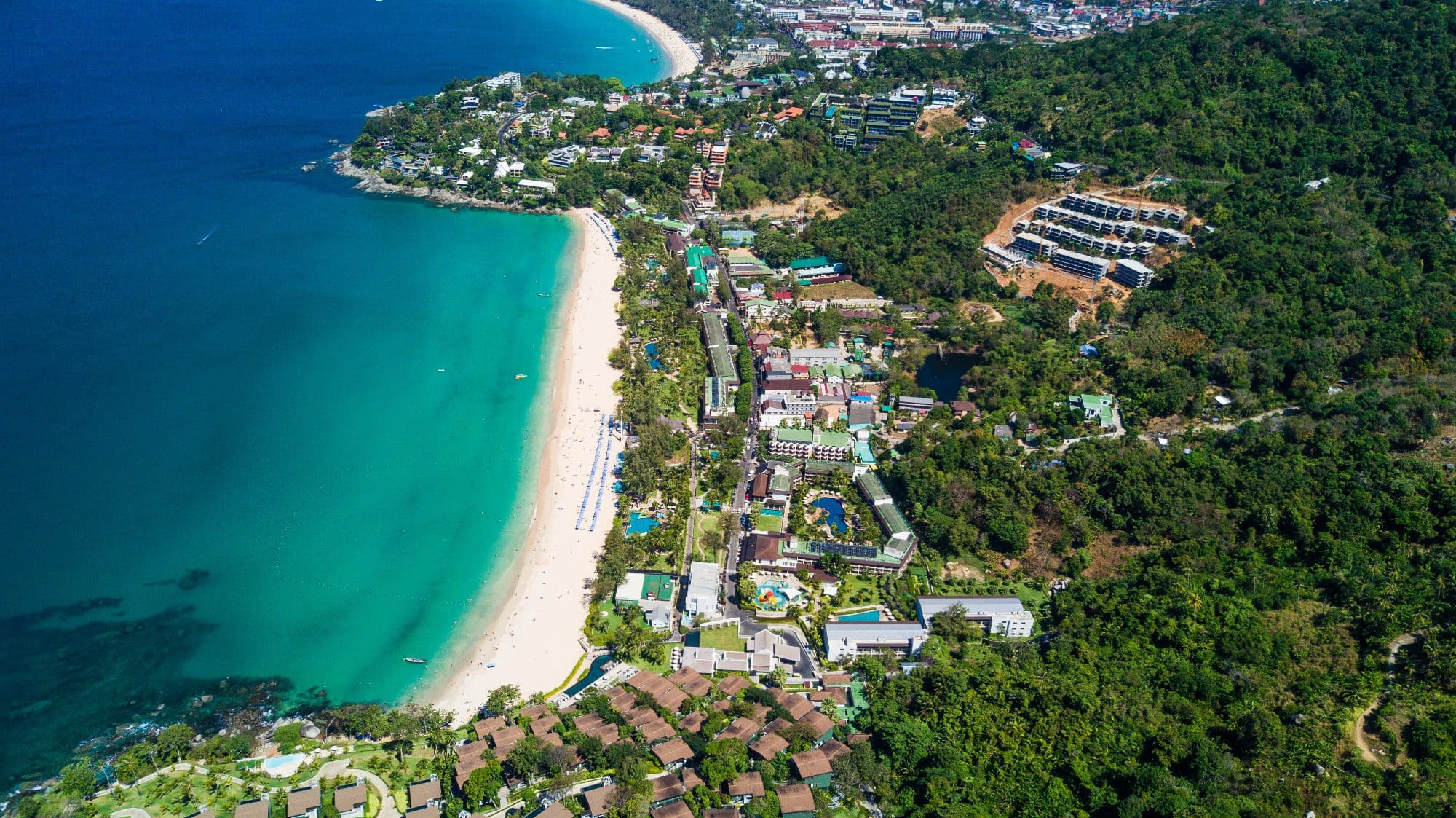
Real estate prices
Apartments in areas like Thalang can be found for around ฿12,000,000 (approximately $343,000 USD), while more luxurious options, such as those at Kata Rocks in Mueang Phuket, can go up to ฿55,000,000 ($1.57 million USD).
Condos offer a similar range, with prices starting at about ฿3,500,000 ($100,000 USD) in Kathu for more modest options, and reaching up to ฿14,500,000 ($414,000 USD) in Thalang for more upscale properties.
When it comes to villas, the prices tend to be higher, especially for properties in prime locations. For example, a 2-bedroom villa in Rawai might cost around ฿16,900,000 ($484,000 USD), while a luxury villa in Chalong could be priced at around ฿14,000,000 ($400,000 USD).
Finally, houses in Phuket also vary widely in price. In Kathu, a 2-bedroom house might be priced around ฿9,900,000 ($284,000 USD), offering a balance between affordability and location.
For more details on buying real estate in Thailand, read our Moving To Thailand guide.
Healthcare on Phuket Island
Bangkok Hospital Phuket and Phuket International Hospital are the top private hospitals on the island with English-speaking staff.
For more routine care, there are several well-equipped clinics throughout the island, such as Central Festival Medical Center and Patong Hospital, offering services from general consultations to minor surgeries.
Public hospitals, like Vachira Phuket Hospital, provide more affordable care, though they can be busier and have longer wait times.
Health insurance
Local private health insurance costs vary based on coverage and age, but here’s a general idea:
- Basic Coverage: $1,200 - $2,500 per year
- Comprehensive Coverage: $3,000 - $6,000 per year
International health insurance is more expensive but very often more flexible. To make sure you get the best value for money, compare international health insurance options from various providers to find the best deal.
Transportation options and costs
While there are some public transport options like the Smart Bus and local songthaews (those shared pickup trucks you might see zipping around), they’re not exactly the most reliable for daily use—routes can be limited, and they don't always run on a schedule.
Taxis and Grab rides are easy to find, but they can add up quickly, with fares ranging from 200 to 600 THB ($6 to $18 USD) for short to moderate distances.
If you're planning to explore the island or just want the freedom to get around on your own terms, having your own transport is definitely the way to go. Renting a motorbike is a popular and affordable choice, usually costing around 200 to 300 THB ($6 to $9 USD) per day, while car rentals will set you back between 700 to 1,500 THB ($20 to $45 USD) per day.
Buying a car
You can buy a car in Phuket, and many choose to do so for the convenience it provides. Second-hand cars in Phuket can range widely in price depending on the make, model, age, and condition. On average, you can expect to pay anywhere from ฿200,000 to ฿600,000 (approximately $5,800 to $17,300 USD) for a decent used car. Popular models like Toyota or Honda tend to be more affordable and easier to maintain.
When it comes to insurance, you can expect to pay between ฿10,000 to ฿25,000 (around $290 to $720 USD) annually for basic coverage. Comprehensive insurance, which covers a wider range of incidents, can cost more, typically in the range of ฿20,000 to ฿50,000 ($580 to $1,450 USD) per year.
As for taxes, vehicle registration and road tax depend on the engine size and age of the car. Annual road tax typically ranges from ฿1,000 to ฿7,000 ($29 to $200 USD). Older cars or those with larger engines tend to incur higher taxes.
Best location in Phuket
Let's explore the island’s most popular areas with expats.
Rawai
Rawai, down on the southern tip of the island, is a true favorite with expats. It’s got this wonderfully laid-back vibe, with a good mix of locals and expats the feel of a real community. Quiet mornings, strolls along Nai Harn Beach, fresh seafood from a beachside restaurant for lunch—it’s hard not to fall in love with that kind of lifestyle.
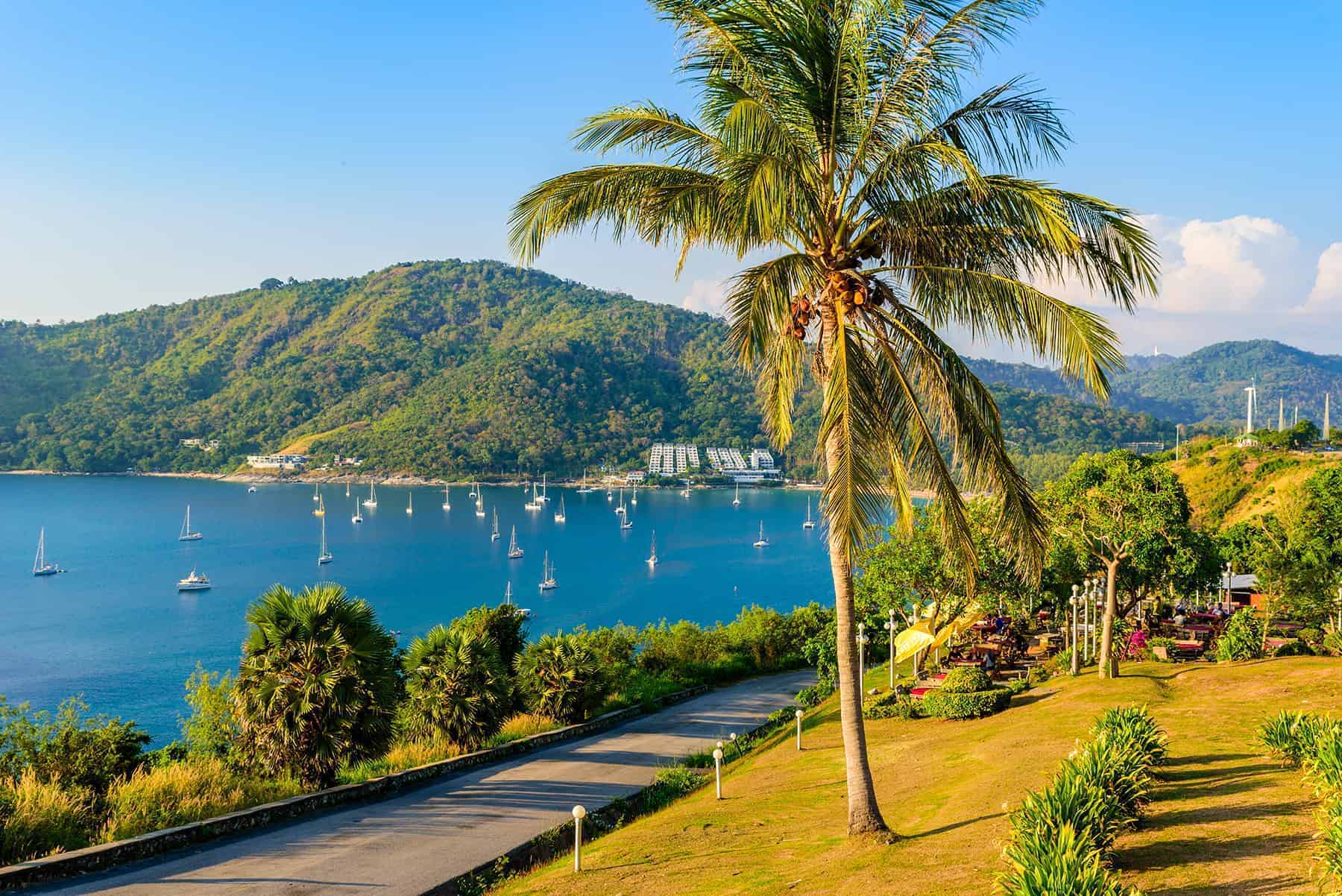
Rawai is calm and serene. If you’re someone who likes to be in the thick of the action, this might feel a little too quiet at times.
Laguna
Laguna is another favorite, especially if you’re after something more upscale. This area is all about comfort, with beautiful golf courses, luxury resorts, and a family-friendly atmosphere. Various community events are held on a regular basis, and connecting with other expats is very easy.
Boat Avenue is like the social hub of the area, where you can always find someone enjoying a coffee or an evening drink. The only downside? It can feel a bit like living in a bubble—everything is so polished and perfect that you might miss a bit of that authentic, gritty side of Phuket.
Kathu
Kathu strikes a great balance between being affordable and conveniently located. You’re close enough to Patong to enjoy the nightlife when you want it, but you can retreat to the peace of Kathu at the end of the day. You can hit the golf course in the morning and then head to Patong for dinner. Plus, the nearby waterfalls and nature trails are perfect for a quick escape.
The trade-off is that being centrally located, it doesn’t have the beachy vibe that places like Rawai offer—it’s more suburban.
Other locations to consider
Patong: Known for its great nightlife and huge tourist crowds, Patong is ideal for expats who enjoy a lively atmosphere and a plethora of dining and shopping options. It is home to Jungceylon Mall - a large shopping center with a big food court and a cinema.
However, the whole area does get noisy and crowded and the beach gets very busy.
Kata: Offers stunning beaches, like Kata Beach and Kata Noi, and a relaxed, family-friendly vibe. It’s less crowded than Patong but still has plenty of restaurants, cafes, and shops to keep life convenient. Kata is especially popular among families, couples, and water sports enthusiasts, thanks to its safe environment and great surfing spots.
Thalang offers a peaceful lifestyle with convenient access to beautiful beaches like Bang Tao and Layan. It's well-suited for families and retirees, featuring luxury residential developments, proximity to Phuket International Airport, and amenities such as international schools, shopping centers, and golf courses.
Karon: A quieter alternative to Patong, Karon is great for families and couples looking for a more laid-back environment. Its long sandy beach and serene atmosphere make it a perfect peaceful retreat.
Kalim: This area is a haven for surfers, offering excellent wave conditions and a relaxed vibe. Less crowded than neighboring Patong, it is a preferred spot for expats who enjoy outdoor activities.
Bang Tao: Known for its all-inclusive luxury resorts, Bang Tao is all about high-end living and top-notch amenities. The area is popular for its upscale lifestyle and beautiful beach.
Surin: Featuring a lovely beach and quiet surroundings, Surin is home to upper-end hotels and is an ideal spot for a more exclusive and tranquil lifestyle.
Kamala: A very relaxed area, Kamala is perfect for expats wanting to avoid the crowds. It's known for its peaceful vibe and community feel, making it a popular choice for long-term residents.
Mai Khao: Offering a secluded atmosphere and several luxury resorts, Mai Khao is perfect for those who value privacy and tranquility. It's one of the less developed areas, providing a sense of escape from the busier parts of the island.
Phuket Old Town: popular with expats looking for culture, history, and artistic vibe. The area is known for its beautiful Sino-Portuguese architecture, lively, colorful markets, and a slower pace of life, which attracts long-term residents, retirees, and creatives seeking an authentic Thai experience. While it’s not close to the beaches, Old Town offers a respite from tourist crowds and a more immersive lifestyle.
Things to do and how much they cost
Old Phuket Town tour: Explore the Sino-Portuguese architecture and visit local museums such as the Phuket Thai Hua Museum. Entry fees for museums range from $3 to $5 USD.
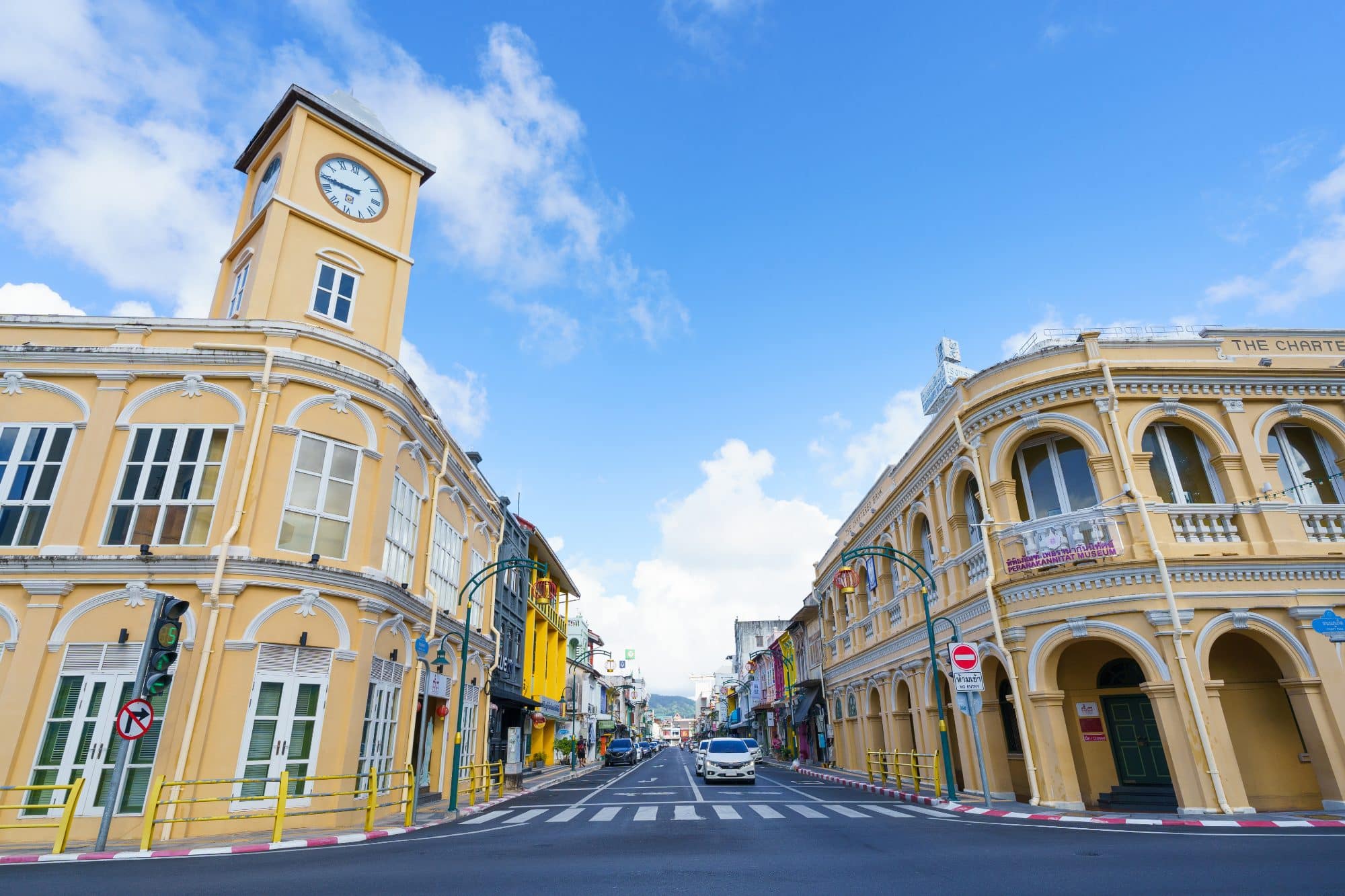
Beach days at Patong Beach: Spend a day relaxing on the beach, swimming, or renting a sunbed for about $3 to $5 USD.
Phuket Elephant Sanctuary: Experience ethical elephant interactions at the sanctuary. Half-day tours cost around $95 USD per person, including a vegetarian meal and transportation.
Local markets: Enjoy fresh produce and local delicacies at markets like the Sunday Walking Street Market in Old Phuket Town. Street food prices range from $1 to $3 USD per item. There are also Weekend Night Markets all over the island where you can find everything from food to souvenirs. Budget around $20 to $50 USD for a night out, including food and shopping.
Yoga classes: Join yoga sessions at studios like Yoga Republic, with drop-in classes priced around $15 USD.
Cinema: Watch the latest movies at the Central Phuket multiplex. Tickets cost about $5 to $7 USD.
Live music and bars: Enjoy live music at places like The Music Matter Jazz Club. A night out, including drinks, may cost around $20 to $30 USD.
Boat tours: Take a day trip to nearby islands such as Phi Phi or James Bond Island. Organized tours cost between $70 to $100 USD per person, including lunch and snorkeling equipment.
Hiking: Explore trails like the Khao Rang Hill Viewpoint for beautiful views and outdoor exercise. Most hiking spots are free to access.
Phuket FantaSea Show: This popular cultural theme park offers a Las Vegas-style show with dinner. Tickets range from $60 to $100 USD per person, depending on the package.
Wat Chalong: Visiting Phuket's largest and most important Buddhist temple is free, though donations are appreciated.
Scuba diving: Phuket is a world-renowned diving destination. A day of diving, including two dives, typically costs about $90 to $150 USD, depending on the dive sites and operators.
Surfing at Kata Beach: Surfboard rentals are available for about $10 to $15 USD per hour, and lessons start at around $30 to $50 USD for an hour.
Zipline Adventure (Flying Hanuman): Experience the thrill of ziplining through the jungle, with prices ranging from $90 to $120 USD per person, depending on the package.
ATV Tours: Explore the island's terrain on an ATV for around $45 to $70 USD for a two-hour guided tour.
Spa days: Phuket is known for its luxurious spas. A full spa day, including treatments like massages, facials, and scrubs, can cost between $100 to $250 USD, depending on the spa.
Muay Thai training: For fitness enthusiasts, Muay Thai camps offer classes starting at around $15 to $30 USD per session.
Laguna Golf Phuket: One of the top golf courses on the island, where a round of golf costs around $150 to $200 USD, including cart and caddy fees.
Fine dining
Dine at upscale restaurants like Blue Elephant in Phuket Town, where a meal for two with drinks can cost around $50 to $70 USD.
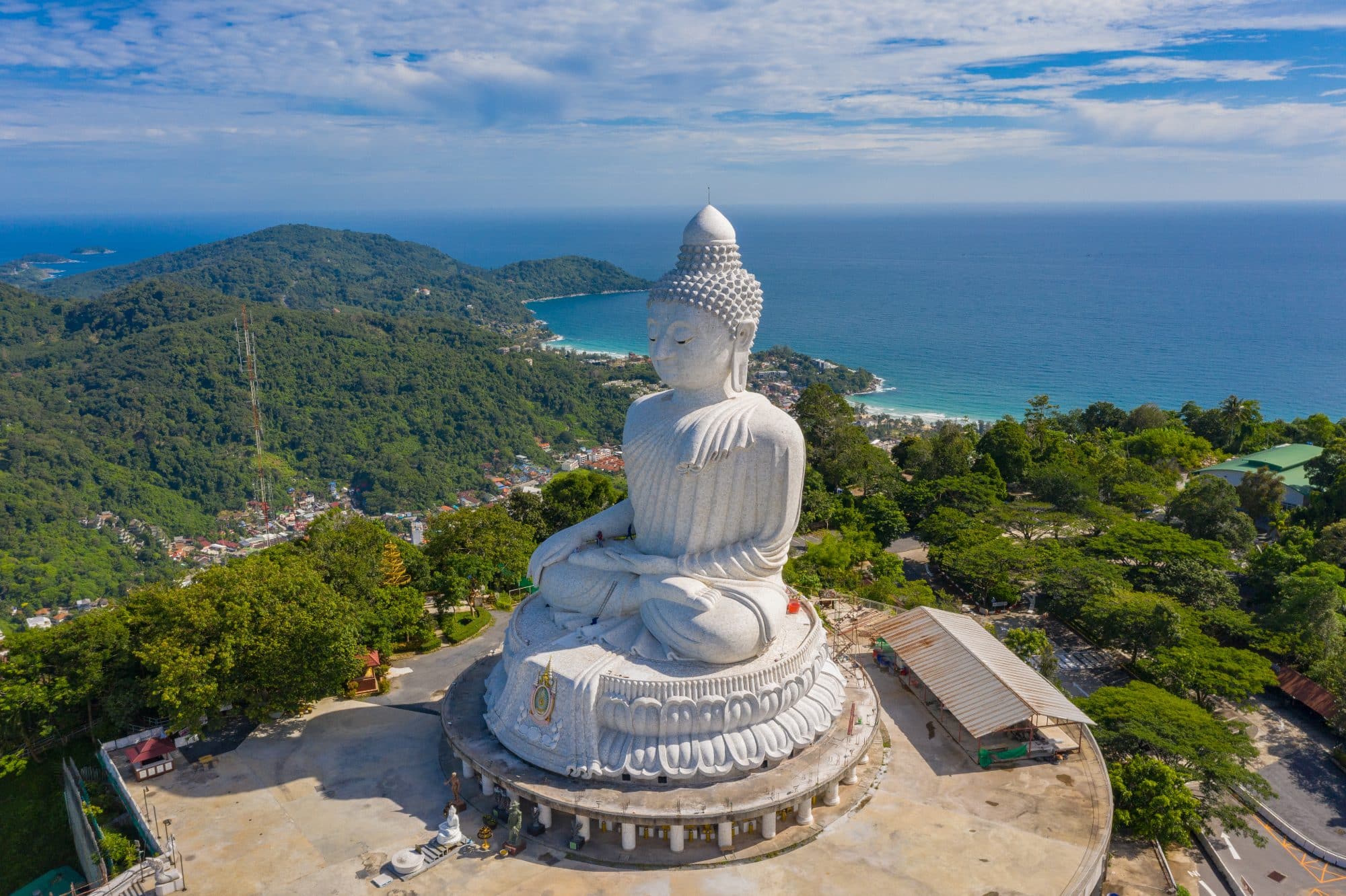
Baba Nest at Sri Panwa Resort on Cape Panwa offers a meal for two with drinks for around $100 to $150 USD, featuring tapas-style dishes with breathtaking views of the Andaman Sea.
Meanwhile, at The Penthouse in the Skye Lake Club, located in the Laguna area near Bang Tao Beach, a dinner for two ranges from $70 to $120 USD, depending on the selection of dishes and drinks.
As a more affordable option, try seafood dinner at Rawai. Depending on the dishes you choose, a meal for two by the beach can cost between $30 and $50 USD.
Safety
Phuket is generally considered safe, but like any popular destination, it is not without its crime concerns. Petty crimes such as pickpocketing, bag snatching, and scams are the most common, particularly in tourist-heavy areas like Patong Beach. Just be careful, especially in crowded places, and avoid displaying valuables.
Violent crime is relatively rare, but it's always wise to take standard precautions, such as avoiding poorly lit areas at night and being cautious when engaging with strangers.
Health safety
You should be aware of tropical diseases like dengue fever, which can be a risk, particularly during the rainy season. Take preventive measures, such as using mosquito repellent and wearing long sleeves in the evenings.
Food and water safety are generally good, especially in well-established restaurants and hotels, but it's still advisable to drink bottled water and be cautious with street food to avoid stomach issues.
Natural disasters
Phuket is in a region that can experience natural disasters, primarily during the monsoon season from May to October.
The most significant risks include heavy rain leading to flooding and landslides, especially in more rural or hilly areas. While tsunamis are rare, the island was affected by the 2004 Indian Ocean tsunami, and since then, Phuket has established a comprehensive warning system and evacuation plans.
Earthquakes are uncommon, but the region's seismic activity means there is a low but existing risk. Staying informed about weather conditions and following local advisories is key to staying safe from natural disasters in Phuket.
Expat community in Phuket
The expat population in Phuket is diverse, including retirees, digital nomads, and professionals working in various industries such as tourism, real estate, and education. So meeting people and making friends won’t be difficult.
Expat organizations and clubs
Phuket Expat Club is one of the largest and most active, providing regular meetings, informative talks, and social events to help expats settle in and stay informed about local issues.
There are also more specialized groups, such as the International Women's Club of Phuket, which focuses on charitable work and social events for women, and Rotary Clubs that welcome expats interested in community service and networking.
There are also various clubs for activities like golf, sailing, and tennis. The Phuket Yacht Club is popular among sailing enthusiasts, while the Laguna Phuket Golf Club offers a well-maintained course and regular tournaments.
Expat hangouts
The majority of expats in Phuket tend to hang out in areas like Patong, Rawai, Chalong, and Laguna. These areas cater to expat communities, offering Western-style restaurants, cafes, and bars where expats can meet and socialize. Boat Avenue in Cherng Talay, near Laguna, is particularly popular for its weekly night market and multiple restaurants and cafes.
Patong Beach remains a favorite for its nightlife and beachside bars, while Rawai and Nai Harn have a more laid-back, community-focused atmosphere. Chalong is known for its marina and is a hub for boating and yachting activities.
The downsides to consider
Living in Phuket might seem like a dream, but it’s not without its quirks and downsides.
Rush hour traffic feels like a surreal video game, with scooters darting into every imaginable gap like they're chasing bonus points.
Speaking of scooters, if you’re not used to the local driving style, prepare yourself for a bit of a thrill ride—just don’t expect everyone to follow the same rules you’re used to back home.
The weather, while mostly beautiful, can also throw you a curveball. The rainy season isn’t just a light drizzle; it’s more like someone turned the shower on full blast and then left it running for days. You’ll quickly learn that “waterproof” doesn’t always mean “stay dry.”
Besides, there are occasional power outages to deal with, confusing paperwork that haunts all expats, packed restaurants and beaches during the peak season, and other quirks and peculiarities, which are all just part of Phuket’s lifestyle. It’s all about embracing the imperfections and enjoying the ride!
Other popular destinations in Thailand to consider:
- Living In Krabi, Thailand – A Complete Guide
- Living In Koh Samui: A Comprehensive Guide For Expats
- 10 Best Neighborhoods To Live In Bangkok
- 6 Best Neighborhoods To Live In Pattaya, Thailand
- Living In Chiang Mai, Thailand, As An Expat Retiree
You might find useful:
- Moving To Thailand: Expat Guide 2024
- Thailand Visa & Residency Guide
- Best Places To Retire In Thailand: Expat Guide
- Cost Of Living In Thailand: Expat Guide
Secure Peace of Mind with Best-Value International Health Coverage
International Citizens Insurance provide free, no-obligation quotes from the leading international health insurance providers with plans tailored to meet your needs. Trusted by thousands of expats worldwide.











